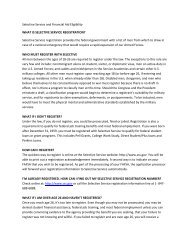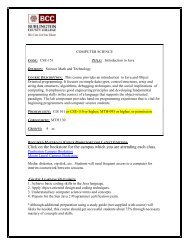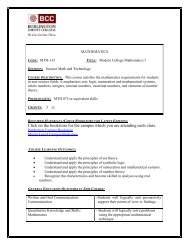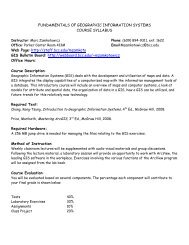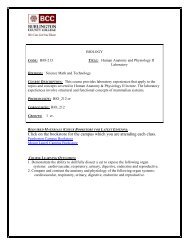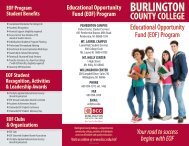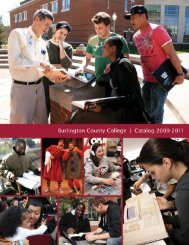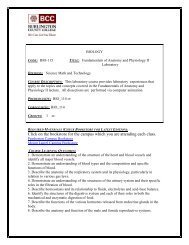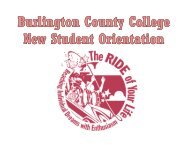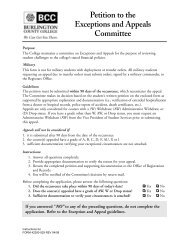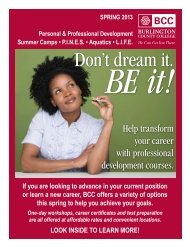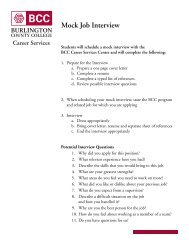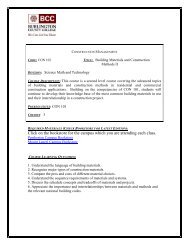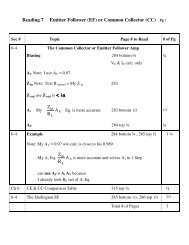BCC Course Outline - Burlington County College
BCC Course Outline - Burlington County College
BCC Course Outline - Burlington County College
You also want an ePaper? Increase the reach of your titles
YUMPU automatically turns print PDFs into web optimized ePapers that Google loves.
BURLINGTON COUNTY COLLEGE<br />
We Can Get You There<br />
PSYCHOLOGY<br />
CODE: PSY 203<br />
TITLE: Human Sexuality<br />
DIVISION: Liberal Arts<br />
COURSE DESCRIPTION: This course is an academic interdisciplinary study of human<br />
sexuality. It focuses on sexual biology, developing sexual relationships, love and<br />
intimacy, sexual choices, contraception, S.T.D., sexual customs, and sex education.<br />
CREDITS: 3<br />
REQUIRED MATERIALS( CHECK BOOKSTORE FOR LATEST EDITION):<br />
Click on the bookstore for the campus which you are attending each class.<br />
Pemberton Campus Bookstore<br />
Mount Laurel Campus Bookstore<br />
INTENDED COURSE LEARNING OUTCOMES/COURSE GOALS /CORE COMPETENCIES/:<br />
Define key terms and concepts<br />
Interpret the sex-for-reproduction legacy<br />
Summarize how the sex-for-reproduction legacy affects current sexual attitudes and<br />
behaviors<br />
Analyze mass media influence on sexuality<br />
Evaluate the development of sexual values and conduct.<br />
GENERAL EDUCATION GOALS INTRODUCED/REINFORCED IN THIS COURSE:<br />
1. f. Students will logically and persuasively state and support orally their points of<br />
view or findings.<br />
5. a. Students will analyze behavioral or societal issues using theories and concepts<br />
from a social science perspective. (1)<br />
b. Students will explain how social institutions and organizations influence<br />
individual behavior. (1)<br />
c. Students will describe and demonstrate how social scientists gather and analyze<br />
data and draw conclusions. (1)
6. a.<br />
b.<br />
i. Students will demonstrate competency in office productivity tools appropriate<br />
to continuing their education. (2)<br />
ii. Students will use critical thinking skills for computer-based access, analysis,<br />
and presentation of information. (1)<br />
i. Students will use appropriate library/learning resource tools to access<br />
information in reference publications, periodicals and bibliographies. (1)<br />
ii. Students will demonstrate the skills required to find, evaluate, and apply<br />
information to solve a problem. (1)<br />
TOPICAL OUTLINE FOR THE COURSE:<br />
TBA<br />
<strong>Course</strong> Activities:<br />
<strong>Course</strong> activities vary from course to course and instructor to instructor. Below is<br />
a listing of some of the activities students can anticipate in this course:<br />
Writing assignments: students will analyze current issues in the field using<br />
current articles from the popular press as well as library research including<br />
electronic resources databases.<br />
Speaking assignments: students will present research individually or in groups<br />
using current technology to support the presentation (e.g., PowerPoint<br />
presentation); students will participate in discussions and debates related to the<br />
topics in the lessons. Discussions may also focus on cross-cultural and legalethical<br />
dilemmas as they relate to the course content.<br />
Simulation activities: Trends and issues will analyzed for their ethical as well as<br />
social or legal significance. Students might role-play common situations for<br />
classmates to analyze. Current news articles may be used to generate discussion.<br />
Case Studies: Complex situations and scenarios will be analyzed in cooperative<br />
group settings or as homework assignments.<br />
Lectures: This format will include question and answer sessions to provide<br />
interactivity between students and instructor.<br />
Speakers: Representatives from various related fields may be invited to speak.
Videos: Related topics will provide impetus for discussion.<br />
Student Evaluation:<br />
The student will be evaluated on the degree to which student learning outcomes are<br />
achieved. A variety of methods may be used such as tests, quizzes, class participation,<br />
projects, homework assignments, presentations, etc.<br />
See individual instructor’s course handouts for grading system and criteria (point value<br />
for each assessment component in course, e.g. tests, papers, presentations, attendance<br />
etc.), number of papers and examinations required in the course, and testing policy<br />
including make ups and/or retests.<br />
GRADING STANDARD:<br />
A Mastery of essential elements and related concepts, plus demonstrated excellence<br />
or originality.<br />
B+ Mastery of essential elements and related concepts, showing higher level<br />
understanding.<br />
B Mastery of essential elements and related concepts.<br />
C+ Above average knowledge of essential elements and related concepts.<br />
C Acceptable knowledge of essential elements and related concepts.<br />
D<br />
F<br />
Minimal knowledge of related concepts.<br />
Unsatisfactory progress. This grade may also be assigned in cases of academic<br />
misconduct, such as cheating or plagiarism, and/or excessive absences.<br />
For other grades, see the current <strong>BCC</strong> catalog.<br />
COLLEGE POLICIES:<br />
The current college catalog and student handbook are important documents for<br />
understanding your rights and responsibilities as a student in the <strong>BCC</strong> classroom. Please<br />
read your catalog and handbook as they supplement this syllabus, particularly for<br />
information regarding:<br />
Academic Integrity Code<br />
Student Conduct Code<br />
Student Grade Appeal Process<br />
NOTIFICATION FOR STUDENTS WITH DISABILITIES:<br />
<strong>Burlington</strong> <strong>County</strong> <strong>College</strong> offers reasonable accommodations and/or services to persons<br />
with disabilities. The Special Populations Department offers comprehensive services to
all students with any form of disability (with appropriate documentation) which hinders<br />
their academic success. Contact Barbara Ericson on Extension 1208 at (609) 894-9311 or<br />
(856) 222-9311 or visit the website at:<br />
http://www.bcc.edu/pages/182.asp.<br />
ADDITIONAL SUPPORT/LABS:<br />
<strong>BCC</strong> provides confidential advising and counseling services free to all students through<br />
the Department of Academic Advisement and Transfer. For more information about<br />
advising and counseling services, visit at the Parker Center or the Mt. Laurel Center at<br />
Laurel Hall, or call extension 7337 at (609) 894-9311 or (856) 222-9311 or visit the<br />
website at:<br />
Advising Website http://staff.bcc.edu/advising/<br />
Counseling Website http://staff.bcc.edu/counseling/<br />
<strong>BCC</strong> offers a free tutoring for all currently enrolled students. For more information<br />
regarding The Tutoring Center call Extension 1495 at (609) 894-9311 or (856) 222-9311<br />
or visit the Tutoring Center Website at http://staff.bcc.edu/tutoring/<br />
Annual Review 2006-2007<br />
KC<br />
11/4/08<br />
8/14/09



